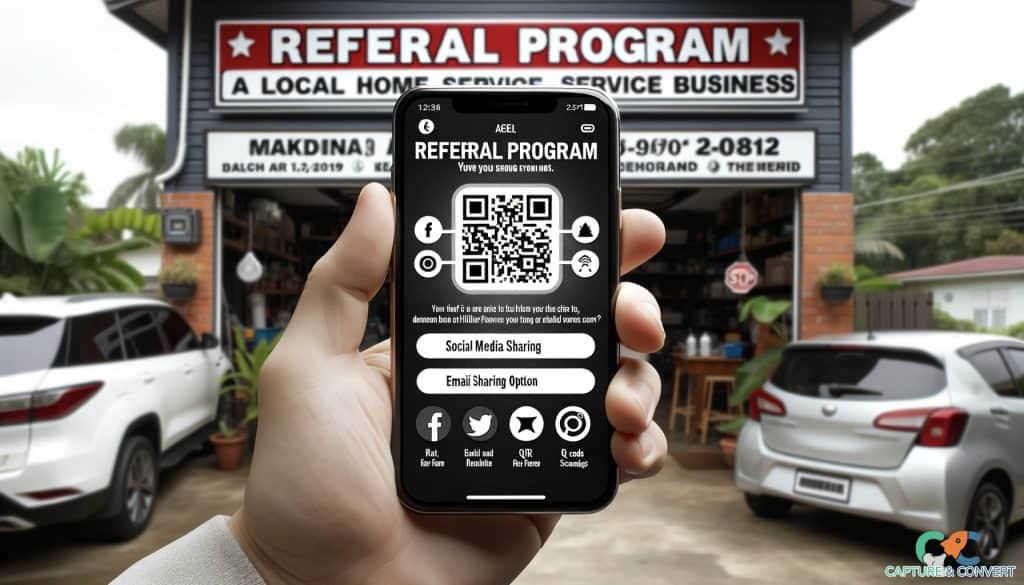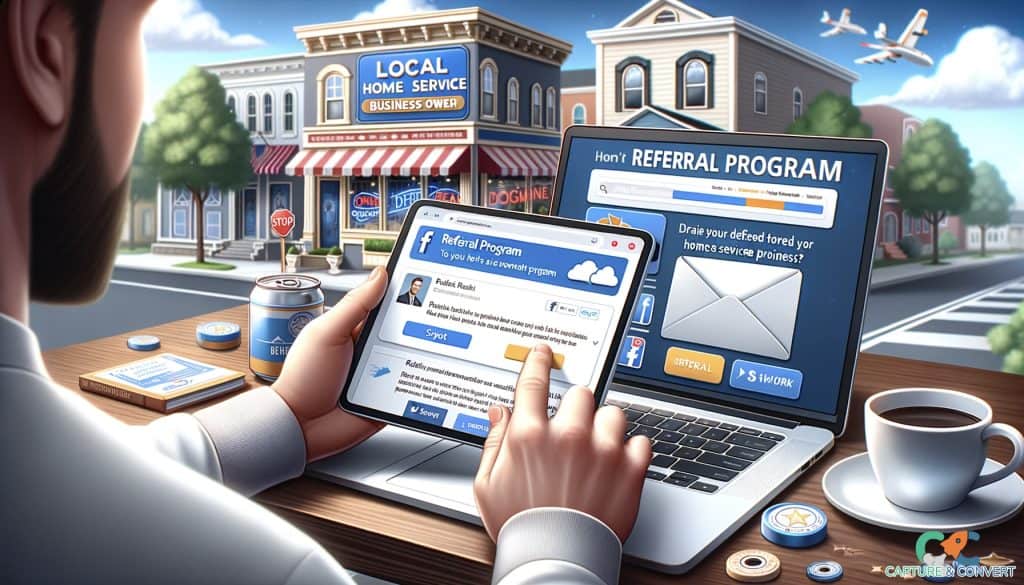Boost your local business leads with 12 key referral program strategies. Understand your audience, optimize incentives, and more to drive consistent referrals.
Referral programs are dynamic marketing strategies that tap into the influence of word-of-mouth recommendations.
In the context of local businesses, they hold immense potential for amplifying lead generation.
The power of word-of-mouth within local communities is unrivaled, as trust is a cornerstone of local interactions.
The effectiveness and growing popularity of referral programs has been proved by a research published by Jaehwuen Jung, R. Bapna, Alok Gupta and S. Sen in the Journal of Management Information Systems on December 10th 2020.
Harnessing this trust through well-crafted referral programs can significantly boost local leads, making it a valuable strategy for businesses looking to thrive within their local markets.
In this article we will explain 12 simple ways to use referral programs to make your business grow.
Contents
- Local vs. Broad Business Referral Programs
- Importance of Referral Programs for Local Businesses
- 1. Deep Dive into Understanding Your Audience
- 2. Craft Irresistible Incentives
- 3. Ensure Easy Sharing Mechanisms
- 4. Harness the Power of Existing Channels
- 5. Set Clear Terms & Conditions
- 6. Referral Tracking & Advanced Analytics
- 7. Continuously Engage & Send Timely Reminders
- 8. Personalize for Maximum Impact
- 9. Implement a Robust Feedback Loop
- 10. Introduce a Tiered Rewards System
- 11. Train Your Team for Referral Success
- 12. Regularly Review & Adapt for Optimal Results
- Referral Programs in Local Lead Generation
- Setting Up a Referral Program
- Integrating Referral Programs with Other Lead Generation Methods
Local vs. Broad Business Referral Programs

A local business referral program sets itself apart from broader initiatives by its acute focus on local audience dynamics.
Unlike broader programs, local referral strategies emphasize tailored incentives and personalized approaches that resonate with the local clientele.
These programs thrive on the close-knit relationships and community bonds that characterize local markets, making them uniquely positioned to drive local lead generation.
Importance of Referral Programs for Local Businesses
Referral programs hold paramount importance for local businesses due to their reliance on word-of-mouth and the inherent trust within local communities.
In local settings, recommendations from trusted sources carry significant weight, and referral programs tap into this dynamic.
They can yield impressive returns on investment (ROI) by leveraging existing customer networks to bring in new leads.
Moreover, these programs foster customer loyalty by reinforcing the sense of community and shared experience within the local market.
Benefits

Local businesses can experience increased sales, stronger brand loyalty, cost-effectiveness, and the acquisition of high-value leads.
Listed below are 5 advantages of referral programs for local businesses.
- Increased Sales: Referral programs can boost revenue by bringing in new customers through recommendations.
- Stronger Brand Loyalty: Referrals often come from satisfied customers, enhancing brand loyalty and trust.
- Cost-Effectiveness: Referral programs can be a cost-effective way to acquire new customers compared to traditional marketing methods.
- Quality Leads: Referred customers tend to have higher lifetime values, providing long-term value to the business.
Challenges
Businesses may face difficulties in managing referral rewards, ensuring the quality of referrals, and mitigating the risk of referral fraud.
Listed below are 5 drawbacks of referral programs for local businesses.
- Reward Management: Keeping track of and distributing rewards to referrers and referees can be administratively demanding.
- Quality Assurance: Ensuring that referred customers align with the target audience and meet the business's quality standards can be a challenge.
- Referral Fraud Prevention: Preventing fraudulent or dishonest referrals requires vigilance to maintain program integrity and fairness.
To overcome these challenges, businesses can implement automated reward systems, establish clear referral guidelines, and employ fraud detection measures.
Listed below are 12 strategies to amplify local lead generation with referral programs.
- Deep Dive into Understanding Your Audience
- Craft Irresistible Incentives
- Ensure Easy Sharing Mechanisms
- Harness the Power of Existing Channels
- Set Clear Terms & Conditions
- Referral Tracking & Advanced Analytics
- Continuously Engage & Send Timely Reminders
- Personalize for Maximum Impact
- Implement a Robust Feedback Loop
- Introduce a Tiered Rewards System
- Train Your Team for Referral Success
- Regularly Review & Adapt for Optimal Results
1. Deep Dive into Understanding Your Audience

Understanding your local audience is crucial for maximizing the effectiveness of your referral program.
By tailoring your approach to their specific needs and preferences, you can significantly boost your program's success.
Listed below are 7 tips to understand your audience as local business.
- Conduct Local Keyword Research: Utilize SEO tools to identify the most relevant local keywords and phrases that resonate with your audience.
- Analyze Customer Feedback: Dive into customer reviews and feedback to understand what local clients appreciate and what concerns they might have.
- Leverage NLP Insights: Implement Natural Language Processing (NLP) techniques to gain deeper insights from customer reviews and social media conversations, helping you fine-tune your approach.
- Create Localized Content: Develop content that speaks directly to your local audience, addressing their specific pain points and interests.
- Segment Your Audience: Divide your local audience into smaller segments based on demographics, behaviors, and preferences to deliver more personalized referral incentives and messages.
- Monitor Local Trends: Stay updated on local trends, events, and news to align your referral program with current topics that matter to your audience.
- Engage Local Influencers: Collaborate with local influencers who have a strong presence and credibility within your target community to amplify your referral program's reach and impact.
2. Craft Irresistible Incentives

Creating compelling incentives is essential for motivating local customers to participate in your referral program and drive more referrals.
The right incentives can make a significant difference in program success.
Listed below are 10 strategies to craft amazing incentives tailored for local audiences.
- Local Discounts: Offer special discounts or promotions on products or services that are particularly popular among your local customers.
- Exclusive Events: Provide access to exclusive local events, workshops, or gatherings as referral rewards.
- Community Support: Donate a portion of referral-generated revenue to local charities or causes, demonstrating your commitment to the community.
- Local Partnerships: Collaborate with other local businesses to offer joint referral incentives, expanding the value proposition for customers.
- Loyalty Points: Reward referrers and referees with loyalty points or rewards that can be redeemed locally.
- Customized Freebies: Give away customized freebies or merchandise featuring local landmarks or themes.
- Early Access: Grant early access or priority reservations for local events or new product releases.
- Recognition: Highlight top referrers from the local community through social media or your website to recognize their contributions.
- Local Experiences: Offer unique local experiences, such as guided tours, tastings, or workshops, as referral incentives.
- Referral Contests: Organize referral contests with valuable local prizes for the winners.
3. Ensure Easy Sharing Mechanisms

Facilitating easy sharing mechanisms is pivotal in increasing the effectiveness of your referral program, as it empowers customers to effortlessly spread the word about your business.
Listed below are 10 tips to implement user-friendly sharing mechanisms.
- Social Media Integration: Incorporate prominent social media sharing buttons on your website and referral program pages to enable users to share referrals with a single click.
- Email Sharing: Offer a simple email sharing option that allows users to send referral invitations directly to their contacts.
- Text Message Sharing: Provide a quick and convenient option for users to share referrals via text messages or SMS.
- QR Codes: Utilize QR codes that link directly to your referral program, making it easy for customers to share in person or on printed materials.
- Pre-written Messages: Offer pre-written referral messages that users can personalize and share across various platforms.
- Mobile-Friendly Design: Ensure that your referral program and sharing tools are mobile-responsive for a seamless experience on smartphones and tablets.
- Easy Copy-Paste: Allow users to copy a referral link or code with a single click for hassle-free sharing.
- Visual Content Sharing: Enable users to share visually appealing content, such as images or infographics, to attract more attention.
- Instant Messaging Apps: Integrate popular instant messaging apps like WhatsApp or Facebook Messenger into your sharing options for wider reach.
- Tracking and Analytics: Implement tracking and analytics tools to monitor the performance of shared referrals and optimize your sharing mechanisms accordingly.
4. Harness the Power of Existing Channels

Leveraging existing channels is a strategic move for local businesses to promote their referral programs effectively, capitalizing on their established presence and engaged audience.
Listed below are 10 ways to harness the power of existing channels to promote referral programs.
- Social Media Promotion: Share referral program details, incentives, and success stories on your social media profiles, encouraging followers to participate.
- Email Marketing: Send targeted email campaigns to your subscriber list, showcasing the referral program's benefits and inviting them to join.
- Website Integration: Embed referral program information and registration links prominently on your website, ensuring visitors can easily access and sign up.
- In-Person Promotion: Train and motivate staff to promote the referral program to customers during in-store visits or transactions.
- Local Partnerships: Collaborate with complementary local businesses to cross-promote each other's referral programs through your respective channels.
- Customer Support: Include referral program information in customer support communications, such as automated emails or chatbots.
- Local Events: Promote the referral program at local events or community gatherings where your business has a presence.
- Online Communities: Engage in local online forums, groups, or community pages, and subtly share your referral program when relevant.
- Blog and Content Marketing: Write blog posts or create content that highlights the benefits of your referral program, and promote this content through your blog and social media.
- Newsletter Inclusion: Feature referral program updates or success stories in your regular newsletters to keep your audience informed and engaged.
5. Set Clear Terms & Conditions

Transparent terms and conditions are fundamental to building trust with your customers in a referral program.
When customers understand the rules and benefits clearly, they are more likely to participate enthusiastically.
Listed below are 10 tips to set transparent terms and conditions for referral programs.
- Simple Language: Write terms and conditions in plain, easy-to-understand language, avoiding legal jargon.
- Highlight Rewards: Clearly state the rewards or incentives for both the referrer and the referee.
- Eligibility Criteria: Specify who is eligible to participate in the referral program, considering factors like location, age, or previous purchases.
- Referral Process: Describe the step-by-step process of making referrals, including sharing methods and tracking.
- Reward Redemption: Explain how and when participants can redeem their rewards or incentives.
- Expiration Dates: If applicable, set clear expiration dates for rewards and communicate them clearly.
- Limitations: Highlight any limitations or restrictions, such as a maximum number of referrals per participant or program duration.
- Compliance: Ensure that your terms and conditions comply with local and national regulations.
- Contact Information: Provide contact information for customer support or inquiries related to the referral program.
- Updates and Changes: Mention that you reserve the right to modify the terms and conditions and how you will communicate any changes to participants.
6. Referral Tracking & Advanced Analytics

Keeping a close eye on your referral program's performance is crucial for optimizing its efficiency and success.
By tracking and analyzing referral data with analytic tools, you can make informed decisions and improvements.
Listed below are 11 tips to implement referral tracking and advanced analytics.
- Utilize Tracking Software: Invest in reliable tracking software or tools that can monitor referral activity, including clicks, conversions, and rewards.
- Custom Tracking Links: Provide unique tracking links to referrers to accurately attribute referrals to their sources.
- Conversion Tracking: Implement conversion tracking to see which referrals result in actual sales or desired actions.
- Referrer Insights: Collect data on referrers, such as their demographics and behavior, to better understand your most effective advocates.
- A/B Testing: Conduct A/B tests on different referral program elements, like incentives or messaging, to identify what drives the best results.
- Segmentation: Segment your referral data to identify which sources or strategies are most successful and focus your efforts accordingly.
- Referral Funnel Analysis: Analyze the referral process from start to finish to pinpoint any drop-off points or bottlenecks.
- Customer Lifetime Value: Calculate the lifetime value of referred customers to assess the long-term impact of your program.
- Fraud Detection: Implement fraud detection measures to identify and address suspicious or illegitimate referrals.
- Regular Reporting: Generate regular reports and performance dashboards to keep stakeholders informed and make data-driven decisions.
- Feedback Integration: Use customer feedback and testimonials to gauge the satisfaction and sentiment of referred customers.
7. Continuously Engage & Send Timely Reminders

Sustaining customer engagement and delivering timely reminders within your referral program can significantly impact its success.
By consistently engaging participants and gently nudging them with reminders, you can encourage continued participation and referrals.
Listed below are 11 tips to continuously engage referral program participants and send timely reminders.
- Engagement Emails: Send periodic engagement emails to program participants, sharing success stories, updates, and new incentives.
- Social Media Updates: Regularly post program updates, referral success stories, and reminders on your social media profiles.
- Push Notifications: Implement push notifications within your mobile app or website to remind users of their referral opportunities.
- In-App Messages: Utilize in-app messages or banners to display referral program information whenever users interact with your platform.
- Referral Milestones: Celebrate referral milestones, such as a certain number of successful referrals, with personalized messages or rewards.
- Email Reminders: Send automated email reminders to participants who have not referred anyone for a while, encouraging them to get back into the program.
- Referral Calendar: Provide a referral calendar or schedule, outlining key program dates, deadlines, and upcoming events.
- Referral Challenges: Organize referral challenges or competitions with attractive prizes to stimulate engagement and referrals.
- VIP Recognition: Recognize and reward your top referrers with VIP status, exclusive perks, or special privileges.
- Feedback Solicitation: Request feedback from participants on their referral experience and use it to make program improvements.
- Responsive Support: Offer responsive customer support to address participant inquiries promptly and assist with any issues they may encounter.
8. Personalize for Maximum Impact

Customizing the referral experience for individual customers can significantly enhance the impact of your program.
When participants feel that the program is tailored to their preferences and needs, they are more likely to engage and refer others.
Listed below are 11 tips to personalize the referral program experience for maximum impact.
- User Preferences: Collect and analyze user data to understand preferences and interests, allowing you to personalize referral incentives and messaging.
- Dynamic Content: Display personalized content and offers based on the user's behavior and history with your brand.
- Segmentation: Divide your customer base into segments based on demographics, behavior, or purchase history, and create unique referral experiences for each group.
- Recommendations: Offer referral recommendations based on a customer's past interactions, suggesting products or services they are likely to refer.
- Referral Channels: Allow users to choose their preferred referral channels, such as email, social media, or messaging apps.
- Personalized Invitations: Enable users to personalize referral invitations with their own messages or recommendations.
- Exclusive Offers: Provide exclusive referral incentives or discounts that align with the individual customer's interests and needs.
- Timing: Send referral reminders and incentives at times when the customer is most likely to engage, based on their previous interactions.
- Feedback Integration: Encourage customers to provide feedback on the referral process and use it to refine and personalize the experience further.
- Personalized Follow-Up: After a referral, send personalized follow-up messages or offers to show appreciation and keep the referrer engaged.
- Customer Journey Mapping: Map out the customer journey and identify touchpoints where personalized referrals can be seamlessly integrated.
9. Implement a Robust Feedback Loop

Establishing a robust feedback loop within your referral program is vital for ongoing refinement and optimization.
By actively seeking feedback from participants and analyzing their input, you can make necessary improvements to maximize the program's effectiveness.
Listed below are 11 tips establish a robust feedback loop in your referral program.
- Feedback Collection: Regularly collect feedback from participants through surveys, email, or in-app prompts, asking about their experience and suggestions for improvement.
- Feedback Channels: Offer multiple channels for participants to provide feedback, making it convenient for them to share their thoughts.
- Incentivize Feedback: Encourage feedback by providing small incentives or rewards to participants who take the time to share their input.
- Feedback Analysis: Analyze the feedback data to identify recurring issues, trends, and opportunities for enhancement.
- Actionable Insights: Use feedback insights to make meaningful changes to your referral program, such as adjusting incentives, messaging, or referral processes.
- Transparency: Communicate the changes made based on participant feedback, demonstrating your commitment to improvement.
- Feedback Follow-Up: When possible, follow up with participants who provided feedback to let them know their input was valuable and that changes have been implemented.
- Testing and Validation: A/B test program modifications to ensure that the changes result in the desired improvements.
- Continuous Monitoring: Continuously monitor the impact of changes and gather ongoing feedback to ensure the program remains effective and aligned with participant preferences.
- Feedback Integration: Use feedback to refine not only the referral program but also other aspects of your business, such as product development, customer service, and marketing strategies.
- Responsive Support: Maintain responsive customer support to address immediate concerns and issues raised in feedback.
10. Introduce a Tiered Rewards System

Introducing a tiered rewards system within your referral program can provide added motivation for customers to participate and refer others.
This multi-level reward structure encourages continuous engagement and referrals, ultimately benefiting your business.
Listed below are 11 tips to introduce a tiered rewards system in your referral program.
- Tier Definitions: Define different reward tiers based on referral performance, such as bronze, silver, and gold levels.
- Increasing Benefits: Offer increasingly attractive incentives as customers progress through the tiers, motivating them to refer more.
- Clear Criteria: Clearly communicate the criteria for moving up to higher tiers, such as the number of successful referrals or total referral revenue.
- Tier Exclusivity: Highlight the exclusivity and added benefits of higher tiers to encourage participants to strive for advancement.
- Recognition: Recognize and celebrate customers who achieve higher tiers through public announcements or special badges.
- Incentive Variety: Diversify incentives within each tier to cater to different customer preferences.
- Referral Bonuses: Provide bonus rewards for reaching specific milestone levels within a tier, encouraging participants to aim higher.
- Progress Tracking: Enable participants to track their progress toward the next tier and view the rewards they can unlock.
- Referral Challenges: Organize challenges or competitions that coincide with tier promotions to stimulate participation.
- Tier Maintenance: Establish rules for maintaining tier status, ensuring participants continue to engage and refer to stay in their respective tiers.
- Periodic Evaluation: Regularly evaluate the tiered rewards system's effectiveness and adjust it based on participant feedback and performance data.
11. Train Your Team for Referral Success

Having a well-trained team is essential for the successful promotion and execution of your referral program.
When your staff understands the program's value and can effectively communicate it to customers, you're more likely to see increased participation and referrals.
Listed below are 11 tips to train your referral program team effectively for referral success.
- Program Knowledge: Ensure your team thoroughly understands the referral program, including its goals, incentives, and mechanics.
- Value Proposition: Teach your team to articulate the value of the program to customers, explaining how it benefits both referrers and referees.
- Communication Skills: Provide training in effective communication techniques to help your team engage with customers and encourage their participation.
- Referral Process: Train your staff on the referral process, so they can explain it clearly to customers and assist with any questions.
- Incentive Details: Educate your team about the specific incentives offered in the program and how customers can earn them.
- Handling Objections: Equip your staff with responses to common objections or concerns customers may raise about the program.
- Role Play: Conduct role-playing exercises to help your team practice engaging with customers and effectively promoting the program.
- Tracking and Reporting: Teach your team how to track and report on referral program performance, allowing them to identify trends and opportunities.
- Incentive Distribution: Instruct your staff on how to distribute rewards or incentives to customers who have successfully referred others.
- Feedback Collection: Encourage your team to collect feedback from customers about their experiences with the referral program, which can be used for program improvement.
- Continuous Training: Implement ongoing training and updates to keep your team informed about program changes and improvements.
12. Regularly Review & Adapt for Optimal Results

Regularly reviewing and adapting your referral program is essential to ensure it remains effective and aligned with your business goals.
By evaluating its performance and making necessary adjustments, you can continue to drive results and achieve optimal outcomes.
Listed below are 15 tips to regularly review and adapt your referral program for optimal results.
- Performance Metrics: Establish key performance metrics to track, such as referral conversion rates, participant engagement, and overall program ROI.
- Scheduled Reviews: Set up regular intervals for program reviews, such as monthly, quarterly, or annually, to assess its effectiveness.
- Participant Feedback: Solicit feedback from program participants to gain insights into their experiences and suggestions for improvement.
- Benchmarking: Compare your program's performance to industry benchmarks and best practices to identify areas for enhancement.
- Competitive Analysis: Analyze referral programs offered by competitors or similar businesses to identify innovative ideas or trends.
- A/B Testing: Continuously conduct A/B tests on program elements, such as incentives or messaging, to identify what resonates best with participants.
- Segmentation Analysis: Review the performance of different participant segments to tailor your program to specific audience preferences.
- Incentive Evaluation: Assess the effectiveness of current incentives and consider experimenting with new types or variations.
- Referral Process Simplification: Simplify the referral process based on participant feedback and usage data to reduce friction.
- Feedback Implementation: Use participant feedback to make actionable changes to the program, demonstrating your commitment to improvement.
- Regular Updates: Keep participants informed about program updates and changes through regular communication channels.
- Technology Enhancement: Leverage the latest technology and tools to streamline program management and enhance the participant experience.
- Legal Compliance: Ensure that your program remains compliant with relevant legal and regulatory requirements.
- Stakeholder Collaboration: Collaborate with internal stakeholders, such as marketing and sales teams, to gather insights and align the program with broader business strategies.
- Adaptive Marketing: Adapt your marketing strategies based on referral program performance data to maximize its reach and impact.
Referral Programs in Local Lead Generation

Local businesses should prioritize referral programs for lead generation because they offer a cost-effective and efficient way to acquire high-quality leads within their community.
Referrals come from satisfied customers who already have trust in the business, making them more likely to convert into loyal customers.
In a local context, referrals hold even more value as they tap into the close-knit nature of communities, where word-of-mouth recommendations carry significant influence.
This can result in a steady stream of quality leads, helping local businesses grow and thrive in their neighborhoods.
Setting Up a Referral Program
Listed below are 6 steps a local business can take to set up its first referral program.
- Understand Your Audience: Start by understanding your local audience's preferences and needs, as this will help tailor your program effectively.
- Set Clear Goals: Define specific goals for your referral program, such as increasing sales or expanding your customer base, to guide your strategy.
- Select Incentives: Decide on appropriate rewards or incentives that resonate with your audience, whether it's discounts, exclusive offers, or tangible gifts.
- Create a User-Friendly Process: Develop a simple and user-friendly referral process that makes it easy for customers to participate and share referrals.
- Promote and Launch: Launch your program with clear communication and promotion through your website, social media, and in-store channels, encouraging participation.
- Monitor and Adjust: Continuously monitor the program's performance and gather feedback from participants to make necessary adjustments for ongoing success.
Reviewing and Updating
Monthly or quarterly referral program reviews are a good starting point.
These reviews help assess the program's performance, gather valuable feedback from participants, and adapt strategies to meet evolving business needs.
Regular evaluations ensure that the program stays aligned with customer preferences and continues to drive positive results for the business.
Integrating Referral Programs with Other Lead Generation Methods

Yes, referral programs can coexist effectively with other promotional methods to generate leads.
They complement strategies like loyalty programs by leveraging satisfied customers to bring in new leads.
To promote referral programs alongside other methods, businesses can integrate referral information into their loyalty program communications, share referral opportunities on social media and email marketing, and ensure consistent messaging across all channels.
This synergy can help maximize lead generation efforts while maintaining a cohesive marketing strategy.

